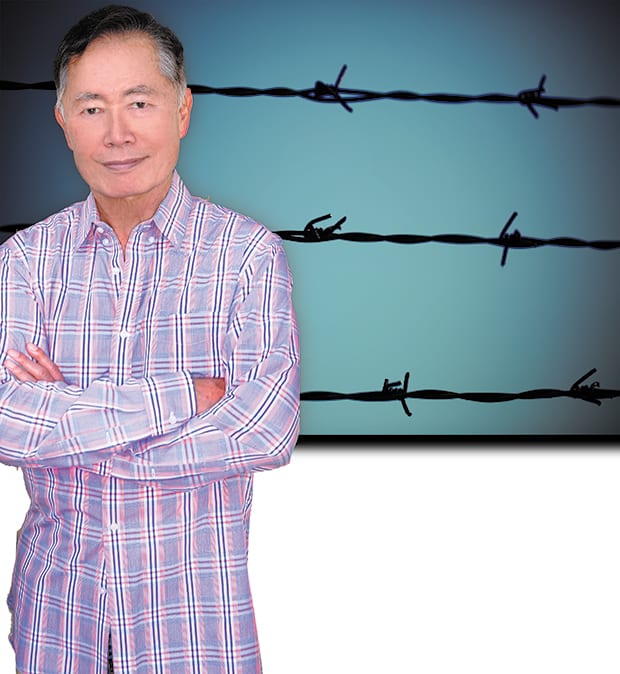Activist, actor and icon George Takei, who got to know Donald Trump on ‘Celebrity Apprentice,’ says the new president has no core values

DAVID TAFFET | Senior Staff Writer
When presidential candidate Donald Trump proposed a ban on Muslims entering the country, George Takei was performing on Broadway in his musical Allegiance, the show based on his childhood experience in a World War II interment camp for Japanese-Americans.
Trump’s plan, he said, shows “the same sort of mentality that put Japanese-Americans in internment camps.”
After Pearl Harbor, the U.S. was swept up in racism, and “We looked like them,” Takei said, referring to the Japanese who had bombed Pearl Harbor. “With no charges, we were swept up, simply because of my grandparents who were immigrants.”
Takei recalled his early childhood as an unending series of assaults and degradation that he related to Trump’s plans: “They’re now talking about a Muslim registry,” he said.
“That’s how it started with us.”
After the registry, Takei said, came a curfew that required Japanese-Americans to be home between 7 p.m. and 6 a.m. Then their bank accounts were frozen. “We had no access to our life savings,” he said.
“Then soldiers came for us.”
In 1942, when George was five, the Takei family was arrested and forced to live in a horse stable in Santa Anita Park before being transferred to a concentration camp in Rohwer, Ark.
“We are determined not to let that happen again,” he said.
Then Takei echoed a prediction coming from a lot of people lately: “I frankly think Donald Trump won’t serve out four years,” he said. “Inevitably, there will be a conflict of interest.”
While he doesn’t think policies under Vice President Mike Pence, should he ascend to the presidency, would be much better, Takei does think the LGBT community would be better off.
“We did battle with him on the religious liberty issue, and he did back down,” Takei said. “We can deal with him as a rational and compromising politician.”
But Trump? Trump has no core values, Takei said, which makes him difficult to gauge, hard to negotiate with and harder to hold to his agreements.
Takei has some personal experience with Trump. In 2012, he was a contestant on The Celebrity Apprentice, which was filmed in New York before that state had marriage equality.
When Trump made some disparaging statements about same-sex marriage to the press, Takei invited him to lunch.
After three months of Takei’s people — that would be his husband Brad — trying to arrange the lunch with Trump’s people — at the time that wouldn’t have been Kellyanne Conway, but someone equally difficult to pin down with a time and date — they met to discuss the issue.
“You know what,” Trump said when he arrived for lunch, “I was at a beautiful gay wedding.”
“So why won’t you support marriage equality?” Takei asked. He told Trump that same-sex couples would travel to New York, stay in his hotels, book his restaurants. Trump stood to profit from same-sex marriage.
“Well, I support traditional marriage,” Trump said.
“I had to restrain myself,” Takei told me. “He’s been married three times.”
Instead of pointing out that irony, Takei defined traditional marriage, as he understands it, to Trump: Two people who are committed to each other.
“No, you have to add on man and a woman,” Trump said.
Takei said they agreed to disagree, but he is as confused as anyone on what Trump actually believes. Once he got the nomination, Trump called marriage equality a settled issue, but then named Jeff Sessions to be attorney general, the person who would defend marriage rights.
“Jeff Sessions. Of all people,” Takei said. And of the rest of the cabinet? “All with a history of homophobia, sexism, racism.”
Takei these days
Currently, Takei is learning his lines for a revival of Stephen Sondheim’s Pacific Overtures that’s headed to New York in March. He said the show is very timely because it takes place during the Shogun period, when Japan was cut off from the rest of the world.
“Bringing weapons that could kill long distance thunderstruck Japan,” Takei explained. “Sort of like Donald Trump being elected and turning things into utter chaos.”
Until he has to be in New York for rehearsals, Takei is doing a few speaking engagements. Holocaust museums across the country have noted the parallels between Trump’s rise to power and the early rise of fascism in Germany in the 1920s as well as the racism that existed in this country in the 1930s and 40s.
On Thursday, Feb. 2, Takei will speak as part of the Dallas Holocaust Museum’s Upstander Speaker Series at Southern Methodist University’s McFarlin Auditorium at 6:30 p.m. Tickets are available on the museum’s website.
Before closing on Broadway, Allegiance, the musical based on Takei’s childhood experience in detention, was filmed. When it was shown in 600 theaters across the country in December, it broke all records for filmed theater and opera. Because of its success, it will be shown again on Feb. 19, significant for being the 75th anniversary of the date
President Franklin Roosevelt signed the executive order under which Takei was arrested at the age of 5 and held in an internment camp until the end of World War II.
Tickets to see George Takei are free to museum members and $25 for nonmembers and available on the museum’s website, DallasHolocaustMuseum.org.
Link for tickets:
https://www.eventbrite.com/e/upstander-speaker-series-george-takei-tickets-29655609727
George Takei started an online petition against a Muslim registry or internment. To sign it go here.
https://www.thepetitionsite.com/882/936/102/sign-george-takeis-petition-against-the-internment-of-muslims-in-the-u.s./
This article appeared in the Dallas Voice print edition January 27, 2017.
